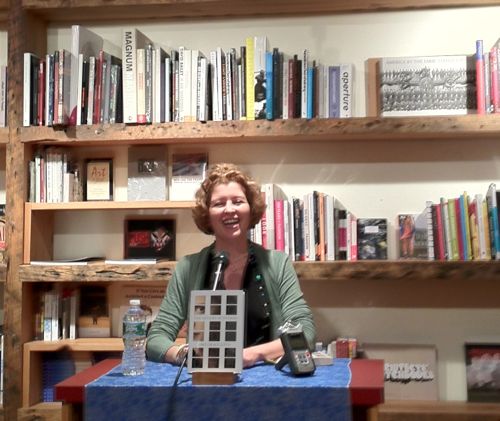
Amy Grace Loyd knows fiction. She spent years editing fiction at Playboy and currently is an editor at Byliner, the digital story service The Atlantic called the Pandora of reading. Now Loyd is promoting her debut novel, The Affairs of Others.
The audience at BookCourt filled with writers, editors, and essayists, all of whom Loyd graciously insists are brilliant, and the proceeds to plug their novels and essay collections instead of her own.
She reads three short sections from the novel. The Affairs of Others follows a woman, a widower, who invests in an apartment building and then selects the tenants she expects will most likely leave her alone. Loyd stresses that her protagonist is a woman who wants to be left alone. As she reads, she seduces the audience with a playful nervousness.
When she concludes, she opens up to audience questions. The first is about the relationship of the protagonist and one of the tenants — a mirror character to the protagonist. They didn’t begin that way, but she agrees they evolved into reflections of the other.
She wrote the novel in the in between moments working as an editor. She wrote on weekends and during her commute on the subway, or whenever she could sneak away. The way she speaks of the process, it seems a grueling work ethic allowed her to grind away.
[pullquote]“Editing can be complementary, or it can steal from you,”[/pullquote]
As an editor, she reads a lot; reading a lot of books is helpful to the process. But its a two-way street. “Editing can be complementary, or it can steal from you,” she says.
Previously, she’s written two novellas. She jokes that publishers want nothing to do with this shorter form of fiction. Both of those works she wrote in an omniscient voice and she wanted, in The Affairs of Others,< to move away from that. Finding the voice for the novel might have been the most difficult part. She wanted to capture the sense of resignation she had earlier achieved, but in a younger person. She also wanted to find the moment where two people believe they understand their relationship and then find that it is fundamentally different than they both believed it was. She was always writing to that moment. When Loyd set out to write the novel, she wanted to stick with a single voice for an extended time, at least longer than stories allowed. The two things she needed were finding the voice and building up to the moment she had planned out. She’s working on new projects and suggests she might write a short story again too.